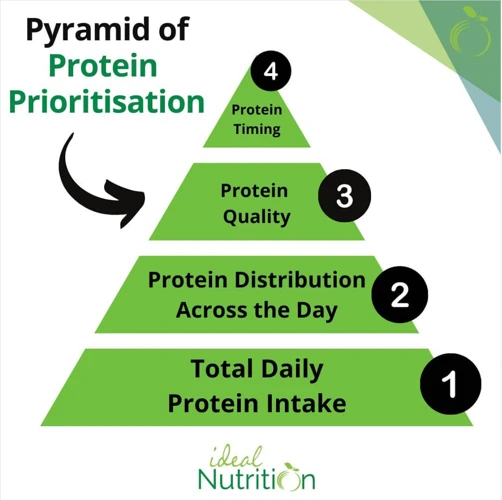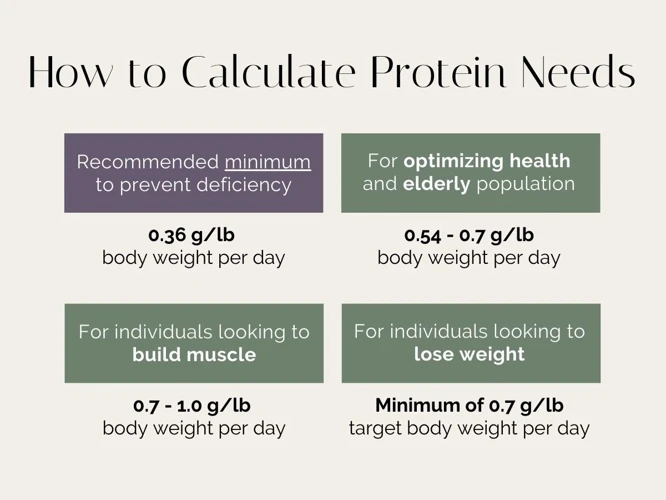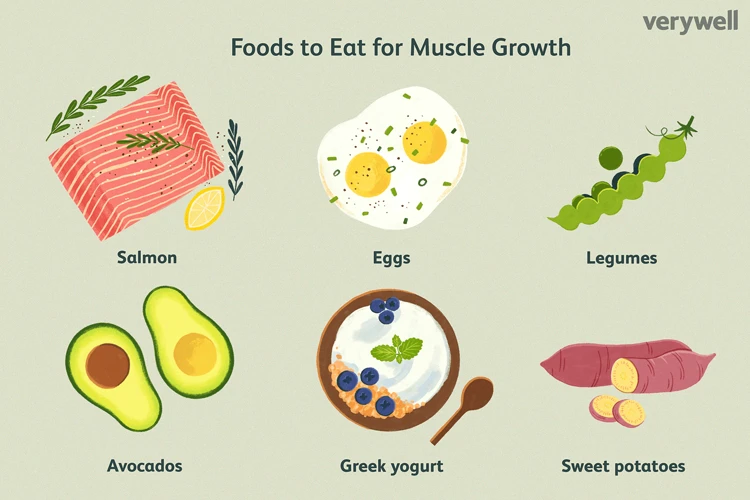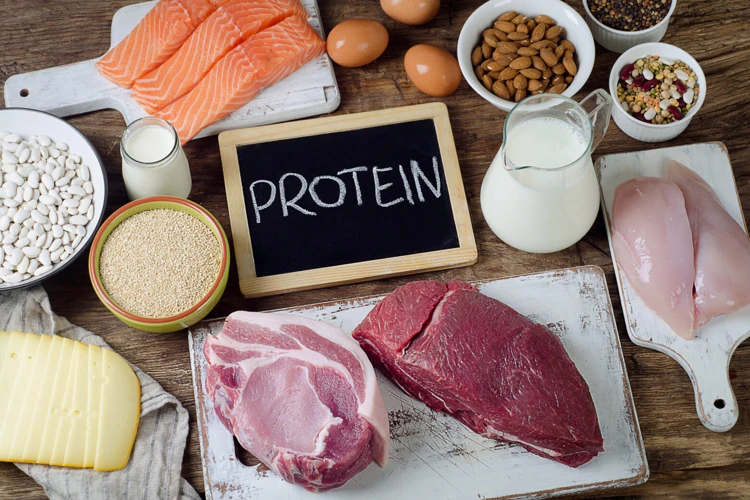The Benefits of Protein for Muscle Growth

Protein is an essential macronutrient that is essential for muscle growth and maintenance. When we exercise, we create small tears in our muscle fibers. Protein plays a crucial role in repairing and rebuilding these torn muscle fibers, which leads to muscle growth and strength gains.
In addition to its muscle-building benefits, protein also helps with satiety, or the feeling of fullness, which can aid in weight management. It also plays a role in other bodily functions, such as hormone production and immune system function.
However, it’s important to note that protein alone cannot build muscle. Exercise, particularly strength training, is also necessary for muscle growth. Carbohydrates also play a role, as they provide the energy needed to fuel workouts and support protein synthesis.
It’s crucial to consume an adequate amount of protein to support muscle growth and maintenance. The amount of protein needed varies depending on various factors, which we will discuss next.
How Much Protein Do You Need?

As protein is an essential macronutrient for muscle growth, it is important to determine how much of it you need in your daily diet. Not getting enough protein can lead to muscle loss and weakness, as well as a range of health issues. However, the amount of protein required varies from person to person based on a number of factors. Understanding the factors that affect protein requirements, as well as the recommended daily intake, can help you make sure you are getting enough protein to support your muscle growth and overall health. To learn more about macronutrients and maintaining a balanced diet, check out our article on daily macronutrient intake.
Factors That Affect Protein Requirements
Multiple factors can affect your daily protein requirement. One of the primary factors that affect your protein requirement is your body weight. The more you weigh, the more protein your body requires to maintain its muscle mass. Athletes or people who engage in regular physical activity also require more protein than sedentary individuals.
Another important factor that can influence protein requirements is age. Children and teenagers who are still developing and growing require more protein than adults. Pregnant and lactating women also require more protein to support the growth and development of their fetus or newborn.
Some medical conditions such as kidney disease can affect your protein requirements. Patients with kidney disease need to limit the amount of protein they consume daily to avoid putting too much strain on their kidneys.
Lastly, your daily carbohydrate and fat intake can also impact your protein requirements. If you consume more carbohydrates, your body may need less protein to maintain muscle mass. A high-fat diet can reduce protein oxidation, which means that you may need more protein to maintain muscle mass.
Factors that affect protein requirements:
| Factors | Impact on Protein Requirements |
|---|---|
| Body Weight | The more you weigh, the more protein your body requires. |
| Age | Children, teenagers, pregnant, and lactating women require more protein. |
| Physical Activity | Athletes and physically active individuals require more protein. |
| Medical Conditions | Patients with kidney disease need to limit protein intake. |
| Carbohydrate Intake | Higher carbohydrate intake can reduce protein requirements. |
| Fat Intake | Higher fat intake can increase protein requirements. |
It’s essential to consider these factors when determining your daily protein requirements. Consulting a registered dietitian can help you determine the optimal amount of protein that your body requires based on your individual factors. Additionally, it’s important to balance your protein intake with a balanced intake of other macronutrients such as carbohydrates and healthy fats.
The Recommended Daily Intake of Protein
The Recommended Daily Intake of Protein
Protein is extremely important, especially when it comes to muscle growth. According to experts, the recommended daily intake of protein depends on various factors such as age, weight, gender, level of physical activity, and overall health status.
The general guideline for healthy adults is to consume 0.8 grams of protein per kilogram of body weight per day. This means that an adult who weighs 68 kilograms (150 pounds) should consume about 54 grams of protein each day.
However, for individuals who are physically active, the daily protein intake may vary. According to Sports Dietitians Australia, those who perform endurance exercises, such as marathon runners, should increase their protein intake to 1.2-1.4 grams per kilogram of body weight. On the other hand, those who perform strength-training exercises, such as weightlifting, should consume 1.6-1.7 grams per kilogram of body weight.
Pregnant and breastfeeding women also need more protein as protein is crucial for fetal and infant growth and development. They should increase their protein intake to 1.1-1.5 grams per kilogram of body weight.
It is important to note that excessively high protein intake can lead to health problems, particularly in people with kidney disease. It is always better to consult a health professional to calculate one’s daily protein requirement and ensure adequate intake of other macronutrients such as carbohydrates, healthy fats, and fiber to maintain overall health.
To ensure that you are meeting your daily protein requirement, it is best to incorporate a variety of protein-rich foods in your diet. This can include animal protein sources such as meat, poultry, eggs, and dairy products, as well as plant protein sources such as legumes, nuts, and seeds.
The Best Foods for Protein

Getting enough protein is essential for muscle growth, and making sure that you get it from the right foods is equally important. Protein is found in both animal and plant-based foods, and a well-rounded diet should include both types. Animal proteins, such as meat, fish, eggs, and dairy, are complete proteins that contain all nine essential amino acids that the body cannot produce on its own. Plant proteins, on the other hand, may be incomplete, lacking one or more essential amino acids, but can still be combined to provide a complete protein source. Let’s take a closer look at the best protein sources for muscle growth.
Animal Protein Sources
Animal protein sources are a great way to obtain the necessary macronutrient for muscle growth, which is protein. Animal protein is known as a complete protein, which contains all nine essential amino acids required for muscle protein synthesis. The following table provides a list of the top animal protein sources.
| Animal Protein Source | Protein Content (Per 100g) |
|---|---|
| Chicken Breast | 31g |
| Turkey Breast | 29g |
| Grass-fed Beef | 26g |
| Salmon | 25g |
| Tuna | 25g |
| Eggs | 13g |
| Greek Yogurt | 9g |
Chicken breast is a great source of protein with a high protein content of 31g per 100g. It also contains low amounts of fat and carbohydrates, making it an ideal choice for those who want to limit their intake of carbs and fats.
Another excellent choice is turkey breast, which contains 29g of protein per 100g. Additionally, it is high in vitamin B6 and niacin and low in calories and fat.
For those who prefer red meat, grass-fed beef is the way to go. While it is lower in protein with 26g per 100g, it is also high in iron, zinc, and vitamin B12.
Fish like salmon and tuna are also great sources of protein. They contain essential omega-3 fatty acids, and while they may be slightly lower in protein than chicken, they have significant health benefits such as improving heart health, reducing inflammation, and supporting brain function.
For those who prefer a vegetarian or lacto-ovo diet, eggs and Greek yogurt are also high in protein. Eggs contain 13g of protein per 100g, and Greek yogurt contains 9g. However, it is important to note that they are not complete protein sources and should be combined with other protein sources to ensure all essential amino acids are consumed.
Incorporating animal protein sources into one’s diet is an excellent way to gain muscle mass, as it can provide the body with the necessary amino acids required for protein synthesis. However, it’s essential to moderate their intake as excessive consumption can lead to an increase in saturated fats and cholesterol intake, which can negatively affect overall health.
Plant Protein Sources
Plant-based diets have become increasingly popular over the years, and for good reason. There are many plant-based protein sources that can provide the body with the necessary amino acids for muscle growth and repair. Here are some commonly known plant-based protein sources:
- Legumes: Lentils, chickpeas, black beans, kidney beans, and other varieties of beans are excellent sources of protein. Additionally, they are high in fiber, vitamins and minerals.
- Nuts and seeds: Almonds, cashews, chia seeds, pumpkin seeds, and sunflower seeds are great sources of protein, healthy fats, and other essential nutrients. They are great for snacking or adding to salads, smoothies or oatmeal.
- Whole grains: Quinoa, brown rice, barley, and oats are all nutritious sources of plant-based protein.
- Soy: Tofu, tempeh, and edamame are protein-packed soy products that are easy to incorporate into meals as meat substitutes.
- Vegetables: Broccoli, spinach, and brussel sprouts are all high in protein and low in calories.
It is important to note that plant-based protein sources may contain less of certain essential amino acids than animal-based protein sources. However, consuming a variety of plant-based protein sources can ensure that the body receives all the necessary amino acids. In addition to protein, plant-based sources are also rich in fiber, vitamins, minerals, and healthy fats. They can be a great addition to a healthy and balanced diet.
Contrary to popular belief, it is possible to build muscle and gain strength on a plant-based diet, and many athletes have successfully done so. However, it may require more planning and attention to ensure the body receives the proper macronutrients. You can read our article on plant-based macronutrients to learn more.
It is important to incorporate a variety of protein sources into your diet, regardless of whether they are from animal or plant sources. While animal products tend to be higher in protein, plant-based sources can provide additional health benefits. By consuming a balanced ratio of macronutrients, including enough protein, you can help promote muscle growth and recovery.
How to Incorporate More Protein into Your Diet

Protein is essential for muscle growth, and incorporating more of it into your diet can benefit your overall health and fitness. Here are some tips on how to do it.
1. Plan ahead
It’s important to plan your meals in advance, especially if you’re trying to increase your protein intake. Choose recipes that are high in protein, and make sure you have the ingredients on hand.
2. Choose protein-rich foods
Some of the best sources of protein include chicken, turkey, beef, fish, eggs, dairy products, beans, and nuts. Incorporating these foods into your meals and snacks can help you reach your daily protein goals.
3. Be creative with your cooking
There are many ways to prepare protein-rich foods, so don’t be afraid to get creative in the kitchen. Try grilling, baking, or sautéing your meats, and experiment with different marinades and spices to add flavor.
4. Supplements
If you are struggling to consume enough protein through food, supplements such as whey protein, casein protein, or vegan protein powder can provide an easy, convenient boost to your protein intake.
5. Pair protein with carbs
While protein is important for muscle growth, it’s also important to consume carbohydrates to provide energy for your workouts. Pairing protein with carbohydrates, such as adding beans to rice or having a turkey sandwich on whole-grain bread, can help support your fitness goals.
6. Snack on protein-rich foods
Incorporating protein-rich snacks into your diet can help you meet your protein needs, and can also help keep you feeling full between meals. Some good options include Greek yogurt, hard-boiled eggs, edamame, and jerky.
Incorporating more protein into your diet doesn’t have to be a challenge. With a little planning and creativity, you can easily add more protein-rich foods to your meals and snacks to support your muscle growth and overall health. Remember, a balanced diet that includes healthy fats and carbohydrates is also important for optimal health. Check out our articles on healthy fats and oils and carbohydrates to learn more. Don’t fall for protein myths, read our article on protein myths debunked.
Protein Myths Debunked
Many myths surround the consumption of protein, which have left some people confused about how much protein they actually need to consume. One common myth is that high protein intake is harmful to your kidneys. This is not entirely true. While people with existing kidney problems may need to limit their protein intake, high protein intake does not cause kidney damage in healthy individuals. In fact, studies have shown that active people with normal kidney function can safely consume up to twice the recommended daily intake of protein without causing any problems to their kidneys.
Another common misconception is that protein only comes from meat. While animal protein sources are complete proteins, which contain all the essential amino acids required for muscle growth, there are a variety of plant-based protein sources that are just as effective. Examples of high protein plant-based foods include lentils, quinoa, tofu, and nuts.
It’s also not true that consuming protein immediately after a workout is necessary for muscle growth. While it is true that protein is essential for muscle recovery and growth, studies have shown that the timing of protein consumption is not as crucial as once thought. As long as someone consumes the recommended amount of protein throughout the day, their muscles will have what they need for recovery and growth.
One myth that has been around for decades is that animal protein is superior to plant-based protein. However, recent studies have shown that both animal and plant-based protein sources provide similar benefits for muscle growth, strength, and overall health. In fact, plant-based protein sources may even have additional benefits, such as being lower in saturated fat and high in fiber.
In conclusion, it is important to separate fact from fiction when it comes to protein intake and muscle growth. Consuming adequate amounts of protein is crucial for muscle growth, but high protein intake is not harmful to your kidneys, and animal protein is not superior to plant-based protein. By incorporating a variety of protein sources into your diet and consuming the recommended daily amount, you can ensure that your muscles have everything they need to recover and grow.
The Bottom Line
Protein is an essential macronutrient for muscle growth and overall health. It provides the building blocks for muscle repair and growth, enhances muscle recovery after exercise, and helps maintain muscle mass as we age.
While the optimal amount of protein varies depending on factors such as age, weight, activity level, and fitness goals, it’s generally recommended to consume around 0.8-1.2 grams of protein per kilogram of body weight per day.
It’s important to note that not all protein sources are created equal. Animal sources such as meat, poultry, and dairy provide a complete source of protein with all the essential amino acids, while plant sources such as beans, lentils, and whole grains may require combining to get all the essential amino acids.
Incorporating more protein into your diet can be as simple as including a serving of protein with every meal or snack. Some easy options include adding protein powder to smoothies, incorporating eggs and lean meats into breakfast, and snacking on nuts or Greek yogurt.
Lastly, it’s important to debunk some common protein myths. Contrary to popular belief, consuming more protein does not harm your kidneys or lead to osteoporosis. Additionally, consuming excessive amounts of protein will not necessarily lead to increased muscle growth.
Protein is a crucial nutrient for muscle growth and overall health, and incorporating a variety of sources into your diet can enhance your fitness journey.
Frequently Asked Questions
How does protein aid in muscle growth?
Protein helps to repair and rebuild muscle tissue that is broken down during exercise, which in turn leads to muscle growth.
Can too much protein be harmful?
Consuming excessive amounts of protein can lead to dehydration, kidney damage, and weight gain. It is important to consume protein in moderation.
What are some plant-based sources of protein?
Plant-based sources of protein include beans, lentils, nuts, tofu, and quinoa.
Do I need to consume protein immediately after a workout?
The post-workout “anabolic window” is a myth. As long as you consume enough protein throughout the day, the timing of when you consume it is not crucial.
Can I get enough protein from a vegetarian or vegan diet?
Yes, it is possible to get enough protein from a vegetarian or vegan diet by consuming a variety of plant-based protein sources, including soy, beans, lentils, and quinoa.
What is the recommended protein intake for athletes?
The recommended protein intake for athletes is between 1.2-2.0 grams of protein per kilogram of body weight, depending on the type and intensity of exercise.
Do different types of protein have different effects on muscle growth?
Research suggests that different types of protein, such as whey and casein, may have different effects on muscle growth due to differences in digestion and absorption rates.
Can protein deficiency lead to muscle loss?
Yes, protein deficiency can lead to muscle loss, as the body breaks down muscle tissue in order to meet its protein needs.
How can I tell if I am consuming enough protein?
You can track your protein intake using a food diary or an app. As a general guideline, aim to consume at least 0.8 grams of protein per kilogram of body weight.
Do I need to take protein supplements?
If you are able to meet your protein needs through food alone, then supplements are not necessary. However, they can be a convenient way to increase protein intake for individuals with busy lifestyles or dietary restrictions.







